Barton's hopes of blocking major housing development are dashed as Preston City Council abandons High Court challenge
and live on Freeview channel 276
John Parker, vice-chair of Barton Parish Council, was speaking after Preston City Council announced that it was “reluctantly” withdrawing its High Court bid to overturn a planning inspector’s ruling granting permission for the estate. The authority said it was walking away from the case because of changed circumstances.
It is just over a year since a planning inquiry considered an appeal by developer Wainhomes against the city council's refusal of an application to build the properties on Cardwell Farm, off the A6 Garstang Road. The company had previously been granted permission for 55 dwellings on part of the plot and had wanted to add up to 96 more to the total.
Advertisement
Hide AdAdvertisement
Hide AdThe inspector who heard the case concluded that the city council was wrong to reject the proposal in February 2020, because, at the time, Preston fell fractionally short of being able to show that it had a five-year supply of land available to meet its annual new housing needs.


Under government planning rules, that meant that the authority was obliged to allow housebuilding on sites that were not intended for development - including in areas of open countryside like Cardwell Farm - unless the adverse effects of doing so could be shown to “significantly outweigh” the benefits.
Cllr Parker decried what he claimed was a planning system “stacked against” places like Barton - and said that villagers he had spoken to were “absolutely devastated” that their final hope of stopping even more housebuilding in the area had now evaporated.
“By the time these properties are built, Barton’s housing stock will have gone up by 100 percent [since 2013]. So it’s not nimbyism for people to say that they don’t want any more development - it’s just not sustainable.


Advertisement
Hide AdAdvertisement
Hide Ad“I know half a dozen families who have already left Barton [because of the scale of housebuilding]. We don’t have the infrastructure to sustain these new properties - and so everything starts to creak.
"Preston City Council have been proactive and aggressive in defending this case and I thank them for that - but they have also sometimes moved at a glacial pace and made a series of mistakes over a number of years.
“But developers have three things in their favour: they are agile, they have money - and national government planning policy is stacked against local authorities and local communities,” Cllr Parker added.
The city council mounted its legal challenge shortly after the outcome of the appeal was published last March. Since then, other appeal decisions have backed the stance taken by Preston at the Cardwell Farm inquiry that its minimum annual new housing requirement should be calculated in a different way to that decided by the inspector in the Cardwell Farm case - and one which would see its yearly tally slashed in half.
Advertisement
Hide AdAdvertisement
Hide AdOne such decision came just this month when an inspector upheld the city council’s refusal of five out of six applications to build 557 homes in Goosnargh and another 45 in Longridge, all of which were also in open countryside where development would not usually have been permitted.
In those cases, it was ruled that Preston’s local housing need should be based on the so-called “standard method”, introduced by the government in 2018. The inspector, George Baird - who headed a single, seven-way inquiry - concluded that the new calculation should supersede a previous Central Lancashire-wide agreement to pool and redistribute the annual new housing needs of Preston, Chorley and South Ribble on the basis of figures generated by a spatial strategy dating back to the 2000s.
He found that the standard method represented such a significant change that it rendered out-of-date the local target-sharing arrangement which was signed in 2012 and had been renewed in 2017. As a result, Preston’s new housing need plummeted from 507 homes per year to just 254.
Under that scenario, the city council was comfortably able to demonstrate a five-year supply of land to meet its minimum housing requirements and, as such, was no longer forced to permit development on plots that were not included in its local plan.
Advertisement
Hide AdAdvertisement
Hide AdCrucially, Mr. Baird concluded that the number of planning permissions now granted in Preston meant that it could also meet the five-year supply requirement even if it was held to the higher total of 507 under the 2012 agreement.
The conclusions drawn in the Goosnargh inquiry - which were similar to those that have been reached in appeals involving Chorley Council in recent weeks, as well as in a pivotal wrangle over a proposed estate in the village of Whitestake in South Ribble - appeared to significantly strengthen Preston City Council’s case in its High Court challenge in the Cardwell Farm case.
However, Chris Hayward - the authority’s director of development and housing - says that the council has nevertheless been given legal advice to bring their action to a halt.
“We do not support the decision made by the inspector regarding this appeal and we are disappointed the inspector did not agree with our position regarding the five-year supply of housing within Preston.
Advertisement
Hide AdAdvertisement
Hide Ad“That said, we must acknowledge that since the Cardwell Farm inquiry, the precise dynamics of the council’s position have been refined and our housing land supply has significantly changed.
“In the past 12 months, the situation has moved on to such a degree that the specialised legal team advising the council has made clear that continuing the High Court challenge against the Cardwell Farm appeal decision would not be in the council’s best interests.
“Whilst we are extremely pleased with the more recent appeal decisions in Preston, we are equally disappointed with the Cardwell Farm decision. However, the council must act in the best interests of the city and cannot jeopardise its position, which is to promote a plan-led approach to the sustainable development of Preston.
“We know that Barton Parish Council and many residents share our disappointment with this outcome. We remain committed to delivering homes to meet the housing needs in Preston, but these must be in the right places, in sustainable locations outlined in the development plan,” Mr. Hayward said.
Advertisement
Hide AdAdvertisement
Hide AdWainhomes managing director Richard Chamberlain told the Local Democracy Reporting Service (LDRS) that the company was “pleased that Preston City Council have now decided to withdraw from the legal challenge in question”.
He added: “We look forward to working with the local planning authority on the future ‘reserved matters’ application to be submitted in due course. This investment by Wainhomes will deliver much-needed new home[s], whilst also providing significant benefits to the local community and wider economy.”
Wainhomes says that it wants to start work on the first phase of the development “as soon as practicably possible”.
The Cardwell Farm application was one of more than half a dozen originally granted permission by Preston City Council in 2019 when the authority accepted that it could not show that it had a five-year supply of housing land available.
Advertisement
Hide AdAdvertisement
Hide AdHowever, an attempt by Wyre and Preston North MP Ben Wallace to have the decision ‘called in’ for a decision by the government left the proposals in a kind of planning limbo. That meant that when the authority felt its position had changed early in 2020 - as a result of the outcome of a planning appeal in neighbouring South Ribble - it was able to bring the application back before its planning committee, which reversed its earlier decision and refused it.
Want to see fewer ads? Subscribers to the Lancashire Post get access to the ad-lite version of our website, which features 70% fewer ads and faster load times for a better experience. Find out more here.
Comment Guidelines
National World encourages reader discussion on our stories. User feedback, insights and back-and-forth exchanges add a rich layer of context to reporting. Please review our Community Guidelines before commenting.
